AI Solutions for Supply Chain and Production: Optimizing Efficiency with Technology
Have you ever wondered how that product you clicked ‘buy now’ on arrives at your doorstep almost magically? It’s not magic; it’s the power of advanced AI solutions working behind the scenes of supply chain and production. Dubbed the digital backbone of the modern supply chain, artificial intelligence is transforming the way goods are manufactured, shipped, and delivered to consumers like you.
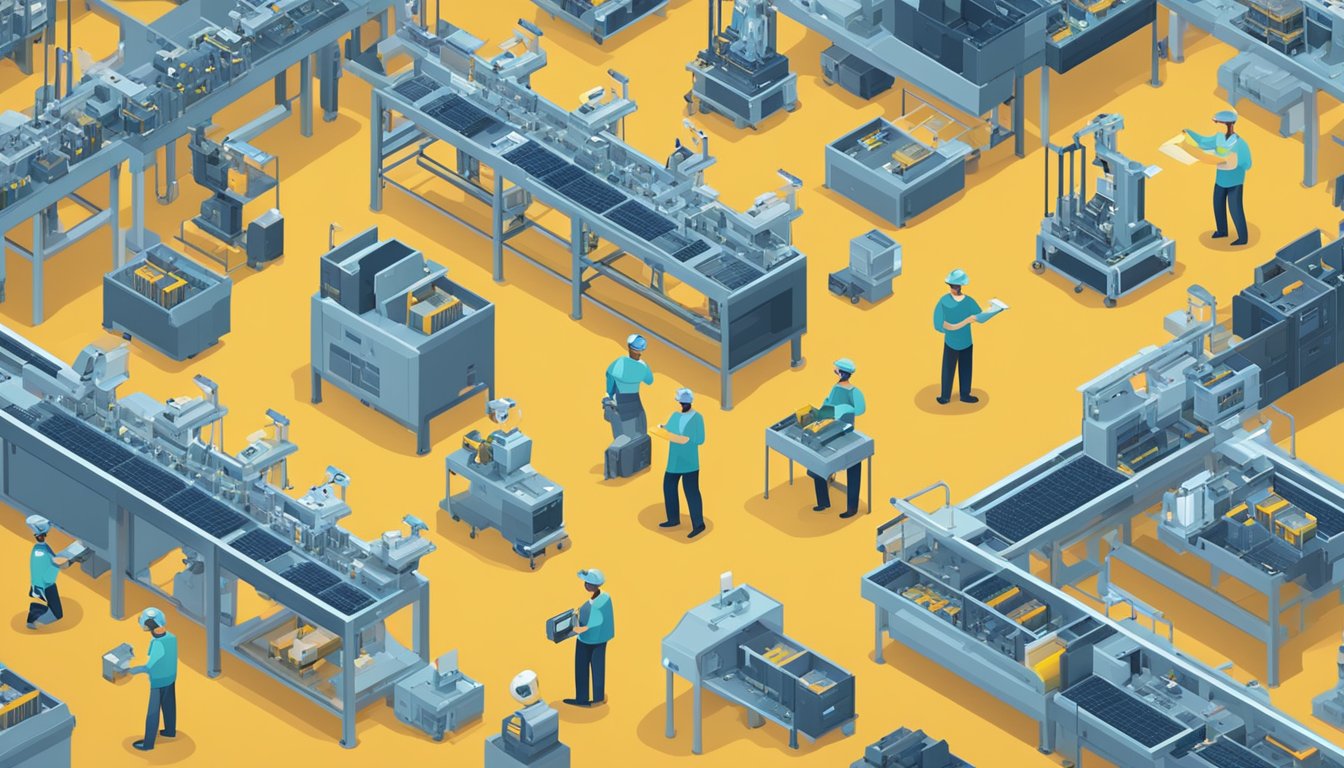
Imagine a world where production hiccups and supply chain meltdowns are ancient history. That’s the promise of artificial intelligence in this sector. By harnessing the power of AI, companies are streamlining operations, reducing waste, and delivering products more efficiently than ever before. From anticipating fluctuations in demand to automating tedious logistics tasks, AI is not just an added technology—it’s becoming a necessity to stay competitive.
But how exactly are these AI-driven solutions changing the game? They’re cranking up the efficiency with predictive analytics, offering real-time data insights into inventory levels, and even optimizing routing for shipping to shave off precious hours and miles. These advanced systems take vast amounts of data—think weather patterns, global economics, and consumer behavior—and turn them into actionable strategies. The outcome? A leaner, more responsive, and highly resilient supply chain that adapts on the fly.
AI in Supply Chain Fundamentals
Supply chains are getting smarter, and it’s all thanks to artificial intelligence. Let’s get down to brass tacks and see how AI is changing the game from warehouses to delivery routes.
Understanding AI and Its Role
Ever wondered how your favorite products land on shelves just in time? AI is a big part of that clever puzzle. AI, at its core, involves machines being able to carry out tasks in a way that we consider “smart”. This includes data processing at lightning speed and machine learning, where systems learn and adapt from experience without being explicitly programmed. In supply chains, AI performs tasks ranging from demand forecasting to optimizing routes, ensuring that everything ticks along like a well-oiled machine.
Here’s what AI can do:
- Forecast demands: It crunches numbers to predict what will be needed where, avoiding overstocking or stockouts.
- Optimize routes: AI finds the quickest, most cost-effective ways to get products from A to B.
- Automate warehouses: Robots, directed by AI, can pick and pack orders round the clock.
Components of AI in Supply Chains
Now, to get the full picture, let’s zoom in on the components. An AI-powered supply chain is no small feat – it’s a symphony of different technologies working in harmony.
- Data Analytics: This is where the magic starts. Massive amounts of data are analyzed to unearth patterns and insights that drive better decisions.
- Machine Learning: Algorithms learn from past data to improve future performance. Think of it like a self-improving cycle that keeps on giving.
- Predictive Analytics: By identifying trends, AI can anticipate issues before they happen, keeping everything on the right track.
With these components, businesses can achieve improved logistics costs by up to 15 percent, slash inventory levels by as much as 35 percent, and boost service levels by around 65 percent compared to the competition lagging behind in tech adoption.
Enhancing Supply Chain Operations with AI
Gone are the days of guesswork in supply chains. It’s time to see how AI streamlines the flow of goods from manufacturers to your doorstep!
Data-Driven Decision Making
Ever dreamt of crystal balls that predict your business future? AI’s your real-world equivalent! With it, operations become smarter because you’re basing decisions on solid data and not just hunches. Imagine having the ability to know what your customers will want before they do. That’s not magic; that’s AI analyzing trends and giving you the heads-up.
Inventory Management and Forecasting
Now, let’s talk shop—or rather stock. With AI on board, inventory management is like having the world’s best personal shopper. This tech gets your business’s style, predicting what you need, how much, and when. No more overstocking or stockouts, just the right amount of stock, right when you need it. Isn’t that a load off your mind?
Logistics and Shipping Optimization
And what about getting your products to their new homes? AI in logistics is like having a super-powered GPS for your entire fleet. It finds the best routes, reducing fuel consumption and ensuring timely deliveries. Your shipping becomes greener and cleaner, all while keeping customers smiling and coming back for more. Talk about delivering the goods!
With AI, you’re not just keeping up; you’re setting the pace in the fast-moving world of supply chain and production. Isn’t it time you let technology take the wheel?
AI-Driven Planning and Strategy
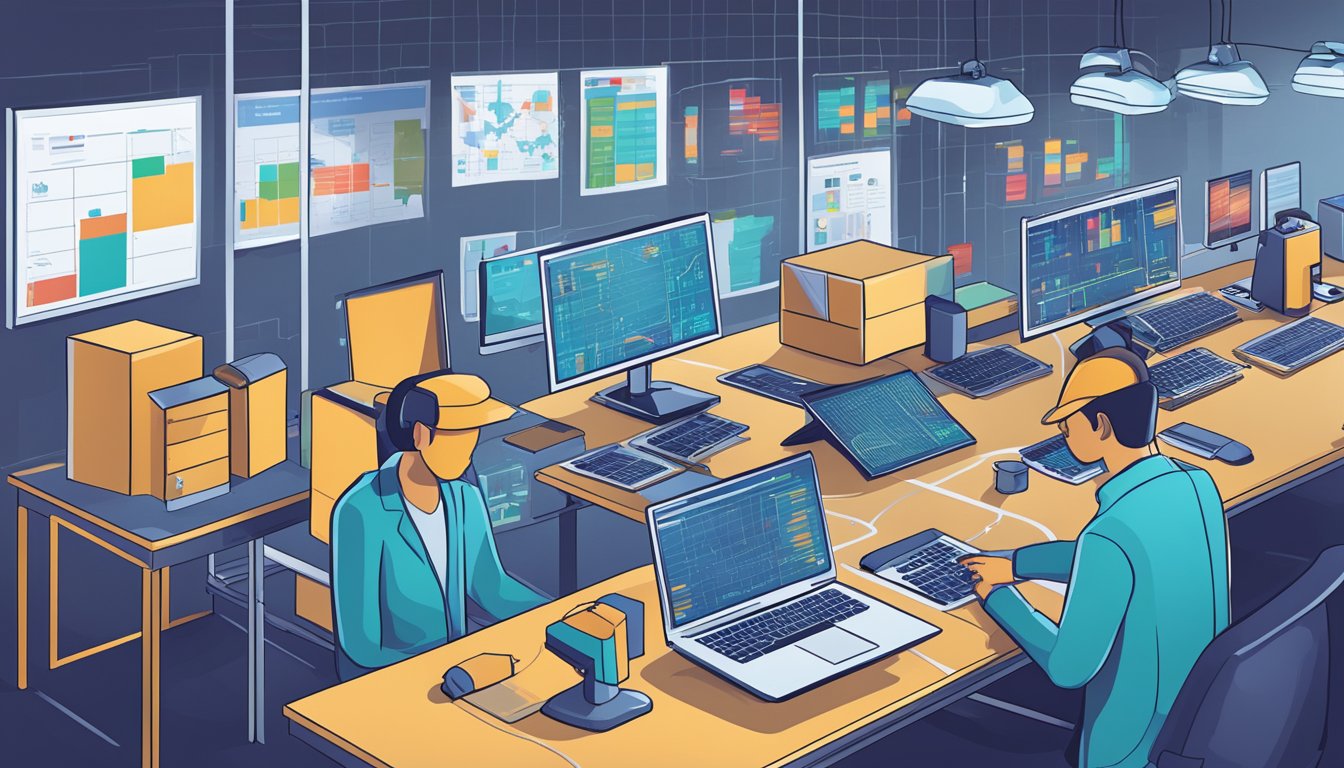
Stepping into the realm of AI-driven supply chain and production, you’re about to explore how artificial intelligence crafts a smarter, seamless future for demand planning and procurement. By harnessing the power of AI, you’ll see how strategy and planning transform from traditional processes to dynamic powerhouses of efficiency.
Strategic Demand Planning
How would you like to predict the future? Well, with AI in strategic demand planning, you kind of can. Imagine this: AI algorithms pore over historical sales data, market trends, and even social sentiments to forecast demand with impressive accuracy. This means you can say goodbye to guesswork, overstock, and stockouts!
By focusing on precise forecasting, companies utilizing AI can anticipate customer needs with far greater precision. Consider this your crystal ball into the consumer world, where you’re no longer reacting to demand changes but anticipating them. The benefits of AI and machine learning in supply-chain performance are well documented, as noted in a McKinsey article, pinpointing how integrated data and interconnected solutions lead to improved outcomes.
Optimizing Procurement Processes
Moving on to procurement, have you ever thought about a well-oiled machine that optimizes your purchasing decisions? AI-driven procurement processes are exactly that. They sift through vast amounts of vendor data, evaluate pricing models, and identify the best times for purchasing based on predictive analytics. The result? Strategic sourcing that saves you time and money.
This shift towards AI helps you to manage procurement with a more strategic lens, focusing on supplier performance, cost-saving opportunities, and risk mitigation. According to Boston Consulting Group, although companies may initially struggle to adjust to an AI-driven approach, the long-term benefits, including streamlined procurement and complexity management, are well worth the investment.
In the grand tableau of your supply chain, AI is the maestro conducting the orchestra, ensuring each instrument – or in this case, each aspect of your planning and procurement – is playing harmoniously. Ready to let AI take the baton?
Challenges and Solutions in AI Adoption
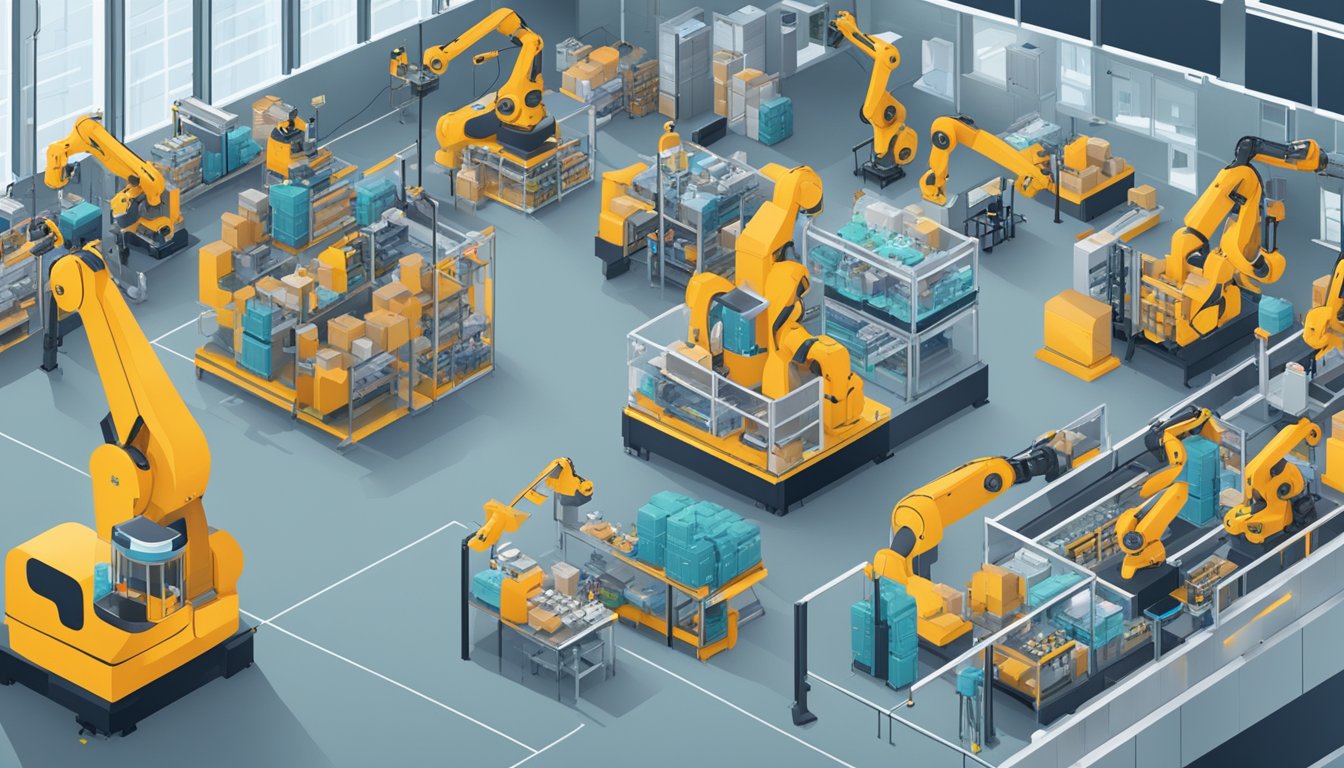
Artificial Intelligence (AI) is transforming supply chains, but it’s not a magic wand you can wave to fix problems overnight. You’re likely to face a range of challenges while implementing AI solutions in your supply chain and production operations, including navigating market disruptions and ensuring stakeholder engagement. Let’s break down these challenges and explore practical solutions.
Navigating Market Disruptions
The COVID-19 pandemic threw the world into disarray, highlighting just how quickly supply chain disruptions can upend production. You might still be feeling the pinch as markets attempt to stabilize. AI can help mitigate these disruptions by forecasting demands and optimizing inventory, but integrating these systems requires thorough analysis and strategic planning. For example, AI-powered systems have been shown to reduce supply chain errors by up to 50%, ultimately reducing lost product orders by as much as 65%. To address the uncertainty, an imperative step is to utilize AI to analyze vast amounts of data, allowing your business to identify trends and prepare for future disruptions.
Stakeholder Engagement and Education
Getting everyone on board with new AI initiatives is crucial. But how do you convince stakeholders, especially when some may not be technologically inclined? Education is key. You need to show them the tangible benefits, like how AI improves logistics costs by 15%, inventory levels by 35%, and service levels by 65% among early AI adopters. Start small with pilot programs and case studies that demonstrate value. Also, consider partnerships with AI experts and vendors as a pathway to bridge the knowledge gap and facilitate smoother transitions.
Remember, integrating AI into your supply chain isn’t just about installing new software; it’s about adapting to new ways of working and ensuring everyone is aligned with the change. Keep conversations open, use clear and straightforward language, and most importantly, show them the numbers—they often speak louder than words.
Leveraging AI for Enhanced Visibility and Transparency
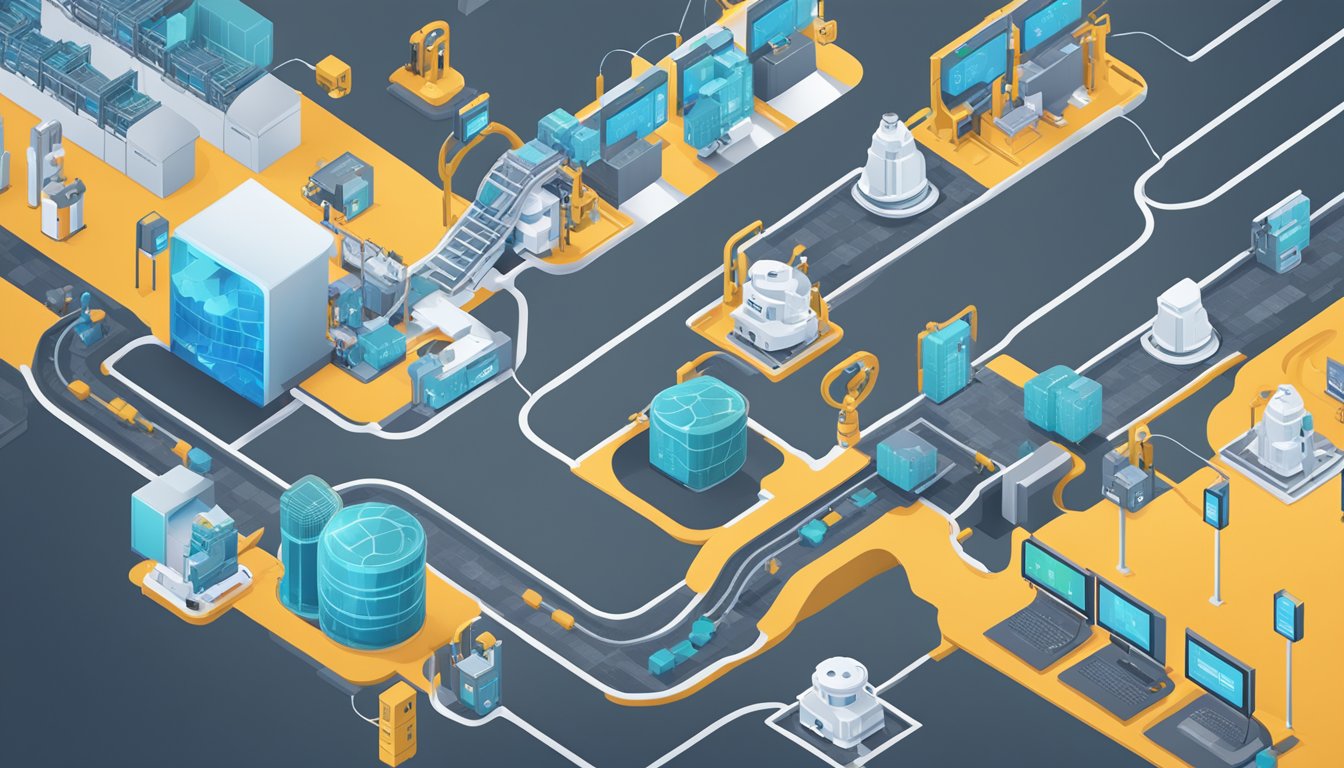
You know how sometimes you feel like you’re in the dark about where your products are and what’s happening in your supply chain? Well, AI is shining a light on these issues, providing the visibility and transparency needed to stay informed and agile.
Real-Time Tracking and Monitoring
Have you ever wished you could have eyes on your products every step of the way? AI makes this possible by enabling real-time tracking and monitoring. You’ll no longer have to guess where your items are or when they’ll arrive. Implementing AI in your operations means gaining the ability to:
- Watch as your goods move along the supply chain. (Visibility in action!)
- Receive alerts about any potential disruptions or delays. (That’s transparency for you.)
Think of it as having a superpower that lets you see through walls—or in this case, complex supply chains.
AI for Greater Supply Chain Transparency
Imagine peering into a crystal ball and seeing every intricacy of your supply chain. AI doesn’t predict the future (yet!), but it does offer unparalleled insights that create a more transparent system. With AI’s prowess in:
- Analyzing large volumes of data, you can detect patterns that are crucial for decision-making.
- Predictive modeling, so you can forecast future demand with impressive accuracy.
These tools aren’t just cool tech—they’re your partners in maintaining a robust supply chain where you’re never caught off guard.
AI-driven solutions are transforming how we understand our supply chains, from internal operations to final delivery. By knowing exactly what’s happening, when, and where, you’re empowered to make smarter decisions, respond to real-time changes, and keep your customers happier. Isn’t it amazing what a dash of AI can do for your business’s transparency and visibility?
Case Studies: AI Success Stories
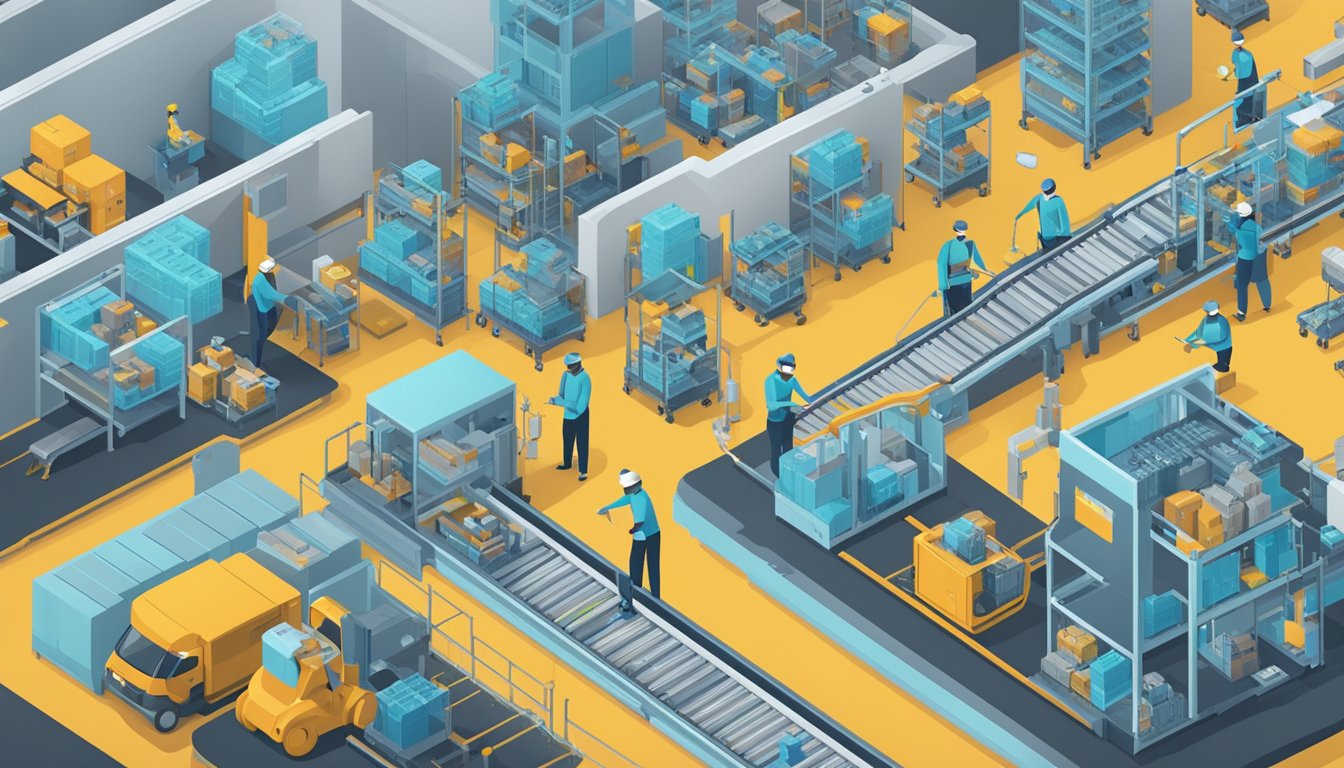
Have you ever wondered how big corporations manage the mind-boggling complexity of their supply chains? Let’s peek into how giants like Walmart and Unilever are not just surviving but thriving by leveraging AI in their supply chain operations.
Retail Innovations with Walmart
Did you catch wind of what Walmart’s been up to lately? They’ve been making waves with their AI-driven demand forecasting. By analyzing a vast array of historical sales data, they account for factors such as promotional activities and seasonal trends. This approach has boosted their inventory management efficiency phenomenally.
- Use cases in play:
- AI-powered inventory management
- Automated restocking systems
- Predictive analytics for demand forecasting
By spearheading these innovations, Walmart isn’t just keeping shelves stocked; they’re paving the way for a smarter, more responsive retail environment. Interested in how they’re doing it? Check this article for an in-depth read.
Unilever’s AI Journey in Supply Chain
Now, let’s turn our attention to Unilever. They’ve embarked on a transformative AI journey within their supply chain that’s nothing short of inspiring. Improving productivity, reducing waste, and enhancing delivery logistics are just a few highlights of their impressive AI strategy.
- Unilever’s AI focal points:
- Sustainability through smarter resource allocation
- AI-enabled logistics for timely deliveries
- Enhancing customer satisfaction with AI insights
Their commitment to integrating AI into every facet of the supply chain is a testament to the potential of this technology. Get the full scoop on Unilever’s AI exploits right here.
So, whether you’re a budding entrepreneur looking to streamline your supply chain, or simply fascinated by the role AI plays in today’s retail and manufacturing sectors, these case studies are bound to provide some thought-provoking insights. Keep an eye on how these strategies evolve—your business might just benefit from adopting similar innovations!
Future of AI in Supply Chain and Production
In the ever-evolving world of supply chain and production, AI is the game-changing element that promises to bring unprecedented efficiency and intelligence to operations. Let’s dig into the specifics!
Emerging Technologies and Trends
Did you know that by harnessing the power of generative AI, supply chain operations can tap into more extensive information processing and real-time data analysis? Imagine having the ability to predict customer demand with stunning accuracy and tailoring supply accordingly. This isn’t just a pipe dream! According to Thomson Reuters, generative AI engines are setting the stage to transform forecasting and risk management, taking supply chain efficiency to new heights.
Now, let’s talk numbers. The market for AI in supply chain is not just growing; it’s skyrocketing, with an expectation to reach a whopping $41 billion by 2030, showcasing a staggering growth rate.
- AI Trends to Watch:
- Generative AI for dynamic planning scenarios
- AI-powered forecasting for razor-sharp precision
- Real-time data analytics for optimized decision-making
Building Resilience and Agility
Resilience and agility – these aren’t just buzzwords. They’re the pillars of a robust supply chain in the face of unexpected challenges. AI shines as a beacon of hope here, turning reactive measures into a proactive, adaptable dance with disruption. A survey mentioned by McKinsey highlights AI’s role in unlocking the highest cost savings in supply chain management to date. But it’s not all about cost; it’s about surviving and thriving in the unpredictable.
- AI’s Role in Resilience and Agility:
- Proactive risk response mechanisms
- Adaptable frameworks for rapid change
- Enhanced supply chain planning from production to inventory management
By harnessing the potential of AI, you’re not just adapting to change; you’re predicting it, preparing for it, and even shaping it to your advantage. Transition to the future of supply chain and production with AI, and you’ll be riding the wave of innovation, not just keeping afloat. Get ready for a smoother, smarter, and incredibly resilient journey ahead.
Implementing AI Solutions
Have you ever wondered what it takes to successfully implement AI in supply chain and production? Rolling out a sophisticated AI solution isn’t just about flipping a switch; it’s a strategic field requiring thoughtful steps and collaboration with the right experts. Let’s jump in and break down these essentials into actionable insights!
Key Steps for Successful AI Deployment
Understand Your Objectives: Before you dive into the world of AI, it’s crucial to pinpoint what you’re aiming to achieve. Are you looking to cut down on logistical costs, streamline inventory management, or boost service levels? Success begins with clear goals, much like early adopters who improved logistics costs by 15 percent and inventory levels by 35 percent.
Develop a Data Strategy: Your AI will need a healthy diet of quality data to perform. Start by collecting and cleansing data from all corners of your operations. AI loves making decisions based on patterns, so the more data you feed it, the smarter it gets—reducing errors by 20-50%.
Foster a Learning System: AI isn’t static; it’s a continuous learner. By establishing a feedback loop, your AI system evolves and adapts, ensuring that improvements are ongoing.
Manage Change: Introducing AI into your operations will involve change at multiple levels. Be prepared to guide your teams through this transformation with adequate training and support, ensuring everyone is on board with these new tech-driven processes.
Selecting the Right AI Partners and Platforms
Evaluate Expertise: A solid AI platform is foundational, but finding a knowledgeable partner can make or break your project. Look for companies that not only have a robust AI offering but also a deep understanding of supply chain nuances and challenges.
Focus on Compatibility: Integration is a cornerstone of AI implementation. Your chosen AI partner and platform should seamlessly sync with your existing systems, minimizing disruptions. For example, AI implementation can face barriers such as technical mismatch or underestimation of the resource investment, so selecting a platform that aligns well with your infrastructure is key (Tandfonline study).
Ensure Scalability: As your business grows, so too should your AI’s capabilities. Opt for a platform capable of scaling up without sacrificing performance—this way, your AI grows alongside your business.
Seek Out Continuous Support: Implementing AI is not a one-and-done deal. Continuous support from your AI partner is essential in navigating the ever-evolving tech landscape, helping you stay ahead of the curve.
By meticulously planning your AI deployment and partnering with the right AI experts and platforms, you lay the groundwork for a transformative journey in supply chain and production management. Just like a thrilling adventure, the right preparation and companions make all the difference. Ready to take the leap into the future?
Frequently Asked Questions
Curious about how AI is reshaping supply chains? Let’s dive into the most pressing questions on this exciting topic!
How can AI transform traditional supply chain management?
AI can revamp supply chains by increasing efficiency and predicting market trends. Companies are leveraging AI’s transformative capabilities to preempt disruptions and streamline operations.
In what ways has AI been a game changer for companies like Amazon in supply chain optimization?
AI has been pivotal for giants like Amazon, providing real-time inventory management and logistics predictions. The integration of AI has revolutionized how supply chains are managed, enabling unprecedented levels of efficiency and responsiveness.
What breakthroughs in AI for supply chain should we expect to see in the near future?
Expect AI to offer deeper insights and more accurate predictions in supply chains. As per McKinsey research, AI systems significantly reduce errors and product order losses, a trend that’s only set to improve.
Can you highlight some successful case studies of AI in supply chain management?
Certainly! Many companies have successfully integrated AI. For example, AI in supply chains has reduced errors by 20% to 50%, and we’re seeing a ripple effect across various industries due to this efficiency.
How can startups leverage AI to disrupt traditional supply chain processes?
Startups can use AI to carve a niche by analyzing large data sets for better demand forecasting and inventory optimization, providing them a competitive edge in the market.
What are some key strategies to implement AI in supply chain for businesses looking to enhance efficiency?
For businesses eyeing efficiency, focusing on optimizing supply chain visibility with AI is crucial. Leveraging cloud-based AI solutions can help process massive data sets to streamline operations and enhance decision-making.








